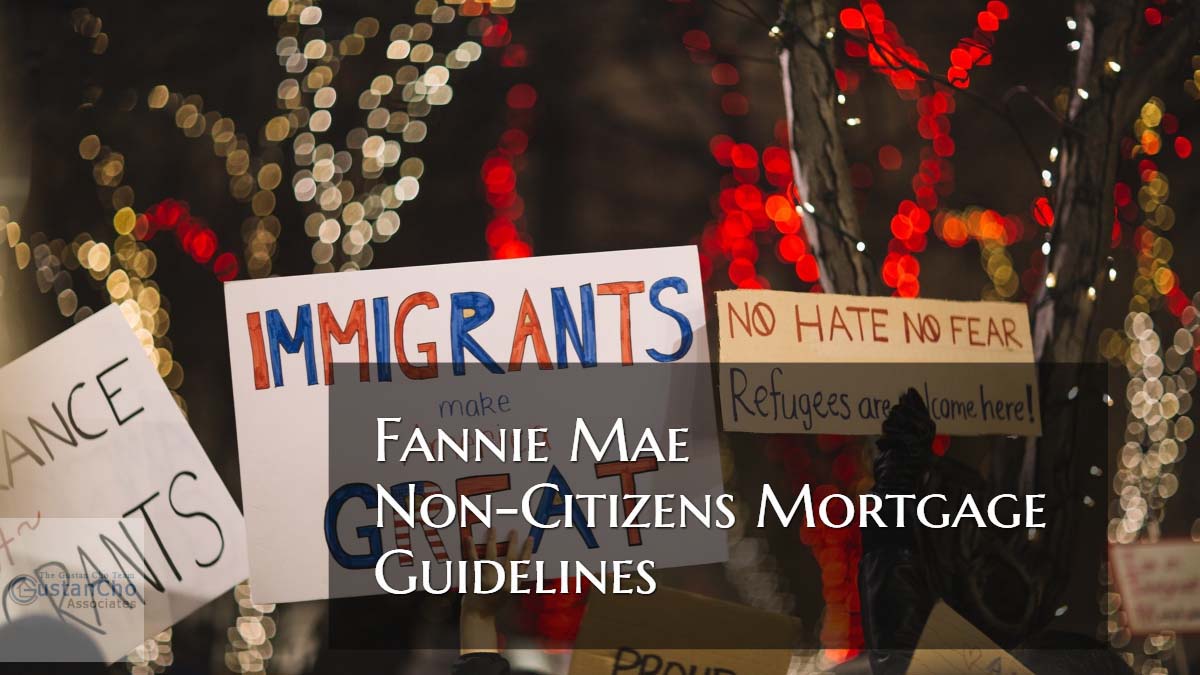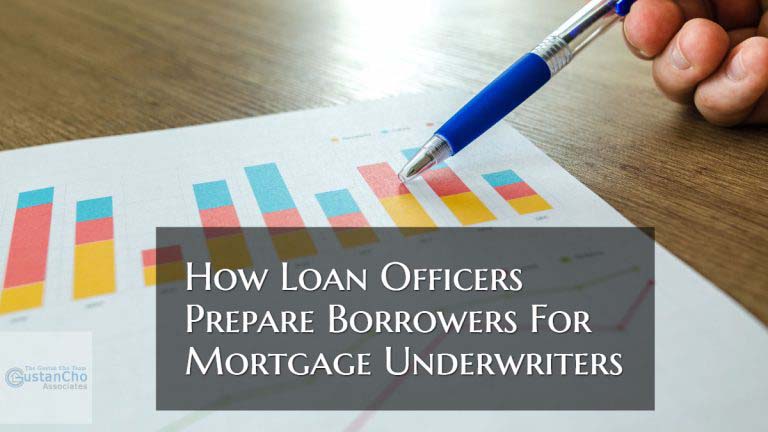This guide covers Fannie Mae non-citizens mortgage guidelines on conventional loans. Recently Fannie Mae added clarity to Fannie Mae non-citizens mortgage guidelines. Per Fannie Mae non-citizens mortgage guidelines on conventional loans, borrowers do not have to be U.S. citizens to qualify for home loans. Fannie Mae non-citizens mortgage guidelines, homebuyers can qualify for a home mortgage without being a U.S. citizen. Dale Elenteny, a senior mortgage loan originator at Gustan Cho Associates says the following about Fannie Mae non-citizens mortgage guidelines:
Fannie Mae non-citizens mortgage guidelines is not a new rule. However, many mortgage underwriters had issues interpreting the Fannie Mae non-citizens mortgage guidelines.
What this translates to is that many non-citizen borrowers were often turned down on conventional loans they qualified. This was for due to the clarity on Freddie Mac and Fannie Mae non-citizens mortgage guidelines on conventional loans. In this blog, we will discuss Fannie Mae non-citizens mortgage guidelines and how non-citizens can qualify for conventional loans.
Freddie Mac and Fannie Mae Non-Citizens Mortgage Guidelines
There are two types of traditional home mortgages:
- Government loans (FHA, VA, USDA)
- Conventional loans
Government Versus Conventional Loans
Government-backed mortgage loans are insured and partially guaranteed by a government agency. FHA, VA, USDA loans are the three government loans in today’s market. FHA, VA, USDA does not originate, process, underwrite, nor funds government loans. Private lenders are the institutions that originate and fund government loans.
If the lender followed agency guidelines on government loans, the government agency will partially insure lenders in the event borrowers default and the loan forecloses.
Conventional loans are not backed by any government agency. Conventional loans are often called conforming loans. This is because conforming loans need to conform to Fannie Mae and/or Freddie Mac Guidelines. Conventional lenders want to re-sell the conventional loans they originate and fund to relieve their warehouse lines of credit. This is the main reason why lenders need conventional loans to conform to Fannie Mae and Freddie Mac Guidelines. If the conventional loans do not conform to Fannie/Freddie Guidelines, then Fannie/Freddie will not purchase the loans.
Own Your American Dream as a Non-Citizen
Unlock Fannie Mae mortgage options tailored for non-U.S. citizens—no citizen, no problem.
Fannie Mae Non-Citizens Mortgage Guidelines on Conventional Loans
Finding a path to homeownership while living in the U.S. in a non-citizen status can feel complicated. Luckily, Fannie Mae has straightforward rules that let non-citizens apply for a conventional loan.
Whether you have a green card, a temporary work visa, or live abroad but have U.S. income, you can still get a Fannie Mae mortgage by meeting key requirements.
This article explains Fannie Mae’s non-citizen mortgage guidelines in simple terms, so you can understand what you need to do to get approved for a home loan.
Who Is Considered a Non-Citizen by Fannie Mae?
Fannie Mae looks at three main borrower groups: U.S. citizens, lawful permanent residents (people with green cards), and non-permanent residents (people on temporary visas and some foreign nationals). You are a non-citizen under their guidelines if you belong to the last two groups.
Suppose you can prove you can live and work legally in the U.S. and satisfy the standard loan qualifications. In that case, you can apply for a Fannie Mae conventional loan. You don’t have to be a U.S. citizen to get a mortgage backed by Fannie Mae.
What you do need is a valid Social Security number. Some borrowers may use an ITIN number if lenders have specific rules that allow it. You’ll also need to show you have a steady income and prove that you legally live or work in the country.
Permanent Residents (Green Card Holders)
If you hold a valid green card, Fannie Mae treats you like a U.S. citizen. You won’t face rules different from those of other borrowers regarding credit, income, assets, and down payment requirements.
To get approved, you’ll need to show:
- A copy of your green card (Form I-551).
- Typical income documents include pay stubs, W-2s, tax returns, and letters from your employer.
- Your Social Security number.
Suppose your income and credit score fit the general guidelines. In that case, you can access the same loan options and interest rates as any citizen.
Non-Permanent Residents: Steps to Get a Mortgage
Non-permanent residents live and work in the U.S. temporarily. They hold work visas such as H-1B, L-1, E-series, and O-series. Even though they are not permanent residents, Fannie Mae lets them qualify for a mortgage. They must complete a few extra paperwork steps compared to U.S. citizens and permanent residents.
To get a conventional loan, a non-permanent resident borrower must:
- They must show that they are legally allowed to work in the U.S. with proof such as a current Employment Authorization Document (EAD) or a work visa.
- Hold a valid Social Security number.
- Provide consistent and documentable income.
- Prove they plan to live in the home as their main residence.
- Satisfy the same credit, debt-to-income (DTI) ratio, asset, and down payment rules as other borrowers.
Lenders primarily focus on whether the borrower’s legal status and work permit are up-to-date and likely to stay valid for the coming years. Fannie Mae does not have stricter rules for non-permanent residents, but lenders sometimes add extra rules, known as overlays.
Employment Authorization and Visa Documentation
If you are not a permanent resident, you need documents that prove you can live and work in the U.S. Approved documents are: Current work visas (such as H-1B, L-1, TN, E-1, E-2, O-1).
Employment Authorization Document (EAD)
I-797 Notice of Action showing visa approval or renewal. The most important point is that the visa or work permit must not expire soon. If the document will expire within a year of the loan closing date, you will need to show you have started the process to renew or that you can keep living and working in the U.S.
Credit Score and Income Standards
If you’re a non-citizen, you’ll face the same requirements on credit and income as any U.S. citizen. Fannie Mae keeps the same qualifying rules for everyone. Here’s what you need to know:
- A credit score of at least 620 is generally required for conventional loans.
- Your debt-to-income (DTI) ratio can’t be above 45%. You might get a pass on this if you have strong compensating factors.
- Your job and income must be steady, easy to verify, and expected to keep coming in.
- You can count W-2 income, self-employment income (but you’ll need two years’ proof), and other legal income sources.
Down Payment Standards
As a non-citizen applicant for a loan on your main home, the down payment rules match what U.S. citizens face. Here’s the basics: Using programs like HomeReady, first-time buyers can put down as little as 3%.
- For conventional loans, the minimum down payment is 5%.
- Suppose you’re buying a second home or investment property.
- In that case, you’ll need a larger down payment, but that’s the same for every borrower, regardless of their immigration status.
Secure a Fannie Mae Loan Without U.S. Citizenship
Discover simplified eligibility, documentation help, and competitive rates for international buyers.
Providing the Money to Close
People not U.S. citizens need to prove where every dollar for the down payment, closing costs, and reserves comes from.
If the cash is in a foreign bank, the borrower must:
- Prove they own the foreign account.
- Show how the money moved to a U.S. bank.
- Give currency conversion papers, if needed.
Lenders must check that the money has been in the account long enough (seasoned), can be traced back to a lawful source, and does not come from organizations banned by federal law.
Guidelines for ITIN Borrowers
Fannie Mae will not back conventional loans for borrowers with only an Individual Taxpayer Identification Number (ITIN) and no Social Security number. A valid Social Security number must qualify under Fannie Mae rules. However, some lenders offering non-qualified mortgages (non-QM) have loan programs for ITIN borrowers. Remember that these loans are not conventional and can have different costs and rules.
Occupancy Type
To get a Fannie Mae-backed mortgage, non-citizens must use the property as their main home. Buying a second home or rental property is usually not allowed for non-permanent residents unless the lender approves extra criteria. Fannie Mae doesn’t outright ban non-citizens from purchasing a second home or rental property. Still, lenders will require tougher borrower checks in those cases.
Lender Discretion and Overlays
Even when Fannie Mae says a mortgage is possible for non-citizens, lenders can still add extra rules, called overlays. These rules can include:
- I need a higher credit score.
- Tighter visa documentation.
- A longer work history is needed.
- More paperwork about visa renewals.
If you’re a non-citizen seeking a mortgage, find a lender who follows Fannie Mae’s core guidelines and knows how to underwrite loans for immigrants and foreign nationals without piling on extra, needless red tape.
What if my visa expires soon?
If your visa or work permit is set to run out within the next 12 months from your mortgage closing date, you can still get the loan if:
- You show proof that your renewal is already being processed.
- Your employer sends a letter saying your job will continue.
- You can prove past visa renewals have always gone through on time.
Fannie Mae lets lenders use their judgment if you and your job will likely stay in the country.
Can Foreign Nationals Get a Fannie Mae Loan?
You cannot get a Fannie Mae mortgage if you do not live or work in the U.S. and have no legal U.S. resident status. Instead, look for:
- Foreign national loan programs from non-QM lenders.
- Portfolio loans.
- Hard money loans.
These options usually need bigger down payments and have higher interest rates.
Your Path to Homeownership—Non-Citizen Edition
Step-by-step guidance on credit, visas, and approval—from application to closing
Common Frequently Asked Questions on Fannie Mae Non-Citizens Mortgage Guidelines
Here’s the FAQ section revamped for clarity, followed by helpful internal links to boost SEO and keep readers moving through your blog on Fannie Mae Non-Citizens Mortgage Guidelines for conventional loans:
Can non-citizens get a Fannie Mae conventional loan?
- Yes.
- Permanent and non-permanent residents can get a Fannie Mae loan if they prove they are legally in the U.S., show enough income, have a reasonable credit score, and meet other basic lending standards.
Must I have a Social Security number to apply?
- Yes.
- Fannie Mae requires a valid Social Security number.
- Borrowers using just an ITIN do not meet this requirement.
Which visas work for non-permanent resident borrowers?
- Fannie Mae accepts H-1B, L-1, E-series, O-series, and other visas that permit work in the U.S.
- An unexpired Employment Authorization Document (EAD) works, too.
Can a non-citizen buy a second home or investment property?
- Fannie Mae allows it, but lenders usually want stricter proof.
- Non-permanent residents are mostly approved for primary residences unless they show strong compensating factors.
Final Thoughts on Fannie Mae Non-Citizen Mortgage Guidelines
Fannie Mae’s easy-to-follow rules allow non-citizens who live and work in the U.S. to buy a home. Lawful permanent and non-permanent residents with work permits can apply for conventional loans if they have good credit, steady income, enough assets, and a plan to live in the home.
While the rules are friendly, some lenders add tougher requirements, known as overlays, which can slow things down. So, choosing a lender that knows the ins and outs of non-citizen buying is smart and keeps the rules simple.
If you’re a non-citizen ready to purchase a home or refinance, Gustan Cho Associates is here to help. We partner with lenders offering no-overlay conventional loan options that meet the needs of immigrant borrowers. Want to get started on your pre-approval? Contact us now and talk to a licensed loan officer who knows Fannie Mae’s non-citizen mortgage rules and will guide you through the whole process, step by step.
Non-Citizen? Qualify for a Fannie Mae Mortgage
Get the resources and tools you need to secure financing as an international homebuyer.








